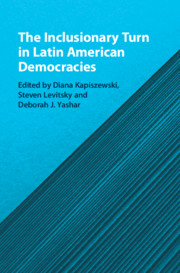Book contents
- The Inclusionary Turn in Latin American Democracies
- The Inclusionary Turn in Latin American Democracies
- Copyright page
- Contents
- Figures
- Tables
- Contributors
- Acknowledgments
- Prologue: Reflections on Two Episodes of Popular Inclusion
- 1 Inequality, Democracy, and the Inclusionary Turn in Latin America
- Part I Extending Social Policy and Participation
- 2 Including Outsiders in Latin America
- 3 Diffusion Dynamics
- 4 Inclusion Without Power?
- 5 Brazil’s Participatory Infrastructure
- Part II Inclusion and Partisan Representation
- Part III New Party–Society Linkages
- Part IV Inclusion, Populism, and Democracy
- References
4 - Inclusion Without Power?
Limits of Participatory Institutions
from Part I - Extending Social Policy and Participation
Published online by Cambridge University Press: 12 January 2021
- The Inclusionary Turn in Latin American Democracies
- The Inclusionary Turn in Latin American Democracies
- Copyright page
- Contents
- Figures
- Tables
- Contributors
- Acknowledgments
- Prologue: Reflections on Two Episodes of Popular Inclusion
- 1 Inequality, Democracy, and the Inclusionary Turn in Latin America
- Part I Extending Social Policy and Participation
- 2 Including Outsiders in Latin America
- 3 Diffusion Dynamics
- 4 Inclusion Without Power?
- 5 Brazil’s Participatory Infrastructure
- Part II Inclusion and Partisan Representation
- Part III New Party–Society Linkages
- Part IV Inclusion, Populism, and Democracy
- References
Summary
Early in the twenty-first century, Latin America became a center for experiments with participatory institutions. While many observers applauded the growing possibilities for building more inclusionary polities, there are limits to the degree of popular sector empowerment delivered by the new institutions, whether instigated by revived left parties, charismatic populists, or technocratic elites. To account for the varying trajectories and limitations of participatory institutions, this chapter looks for inclusion in the most likely cases, starting with the diffusion of a single institution, participatory budgeting, and continuing with an examination of the countries that advanced most in bringing several types of participatory institutions from parchment to practice at multiple levels of government – Brazil, Peru, Venezuela, and Uruguay. Even in these most likely cases, such institutions tended to offer access through low quality channels of participation that entailed consultation rather than effective decision-making, focused on issues or resources of lesser magnitude, restricted involvement to a limited public, or even reinforced clientelism in some cases.
- Type
- Chapter
- Information
- The Inclusionary Turn in Latin American Democracies , pp. 117 - 154Publisher: Cambridge University PressPrint publication year: 2021
References
- 3
- Cited by



